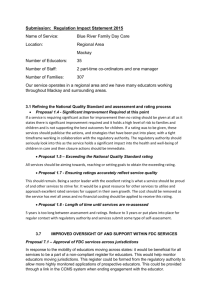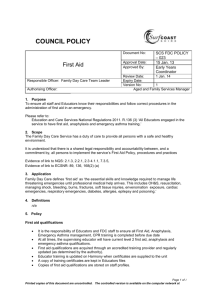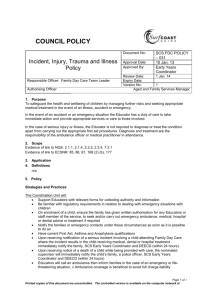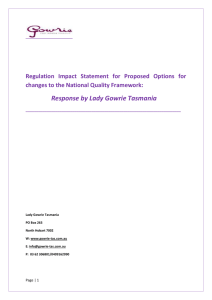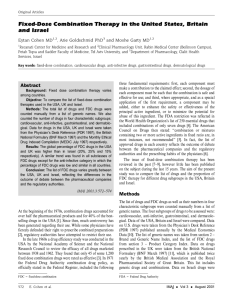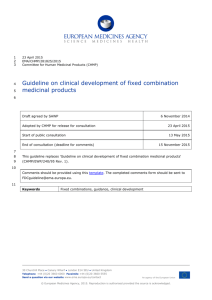Canterbury City Council - Deloitte Access Economics
advertisement
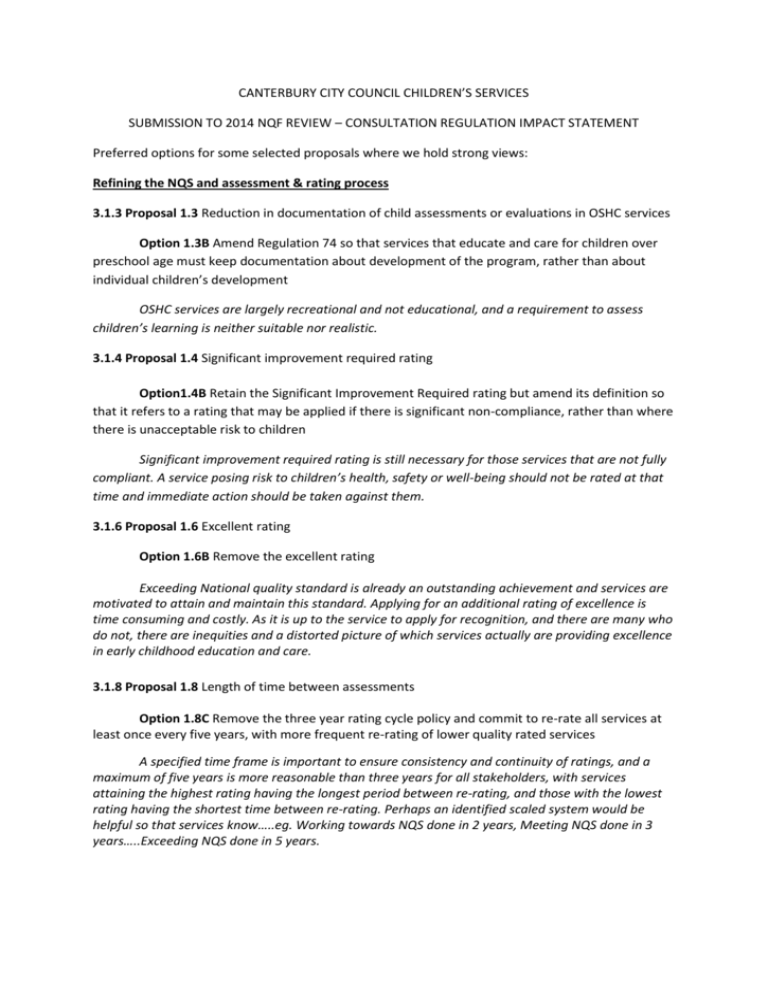
CANTERBURY CITY COUNCIL CHILDREN’S SERVICES SUBMISSION TO 2014 NQF REVIEW – CONSULTATION REGULATION IMPACT STATEMENT Preferred options for some selected proposals where we hold strong views: Refining the NQS and assessment & rating process 3.1.3 Proposal 1.3 Reduction in documentation of child assessments or evaluations in OSHC services Option 1.3B Amend Regulation 74 so that services that educate and care for children over preschool age must keep documentation about development of the program, rather than about individual children’s development OSHC services are largely recreational and not educational, and a requirement to assess children’s learning is neither suitable nor realistic. 3.1.4 Proposal 1.4 Significant improvement required rating Option1.4B Retain the Significant Improvement Required rating but amend its definition so that it refers to a rating that may be applied if there is significant non-compliance, rather than where there is unacceptable risk to children Significant improvement required rating is still necessary for those services that are not fully compliant. A service posing risk to children’s health, safety or well-being should not be rated at that time and immediate action should be taken against them. 3.1.6 Proposal 1.6 Excellent rating Option 1.6B Remove the excellent rating Exceeding National quality standard is already an outstanding achievement and services are motivated to attain and maintain this standard. Applying for an additional rating of excellence is time consuming and costly. As it is up to the service to apply for recognition, and there are many who do not, there are inequities and a distorted picture of which services actually are providing excellence in early childhood education and care. 3.1.8 Proposal 1.8 Length of time between assessments Option 1.8C Remove the three year rating cycle policy and commit to re-rate all services at least once every five years, with more frequent re-rating of lower quality rated services A specified time frame is important to ensure consistency and continuity of ratings, and a maximum of five years is more reasonable than three years for all stakeholders, with services attaining the highest rating having the longest period between re-rating, and those with the lowest rating having the shortest time between re-rating. Perhaps an identified scaled system would be helpful so that services know…..eg. Working towards NQS done in 2 years, Meeting NQS done in 3 years…..Exceeding NQS done in 5 years. Removing supervisor certificate requirements 3.2.1 Proposal 2.1 Removing supervisor certificates Option 2.1B Amend the National Law to remove the requirement for supervisor certificates Agree that the nominated supervisor, deemed responsible by the provider, is all that is required, as long as strong evidence of the person’s suitability is provided. All the other supervisor certificates are superfluous – all staff work under a duty of care and must abide by regulations and providers need to ensure that suitable people are employed. Agree with all related proposals 8.3.1 to 8.3.8, except for 8.3.5 (b) remove the existing notification requirements to regulatory authorities re fitness and propriety – Provider and the Department should still need to have evidence of a nominated supervisor’s suitability. Expanding the scope of the NQF 3.3.1 Proposal 3.1 Additional services to be included in the NQF Option 3.1D Include all BBF centre-based services, occasional care services (excluding those provided for parents attending conferences, sport and leisure activities or shopping), playschools and mobile services in the NQF. All services providing early childhood education and care should be under the same framework in recognition of the work they do and for consistency and assurance for families using these services. Families using our occasional care service are eligible for child care benefit and staff choose to work with the National Early Years Learning Framework They also work under our children’s services policies which are prescribed by the national Law & Regulations. NB: all occasional care services provide care when families attend appointments, gym or shopping (according to the adopted definition of occasional care), so we assume that the above proposed exclusions relates to dedicated services in those particular environments and not to occasional care services in general. NB: We strongly believe that nannies should not be brought under the NQF and should not attract child care benefit, as they are not hired to educate children. This system is about education and care NOT care alone. Extending some liability to educators 3.4.1 Proposal 4.1 Extending some liability to educators Option 4.1B Liability under Sections 165 and 167 of the National Law to be extended to all educators, for not adequately supervising children under their care or not taking every reasonable precaution to protect the children from harm or hazard that is likely to cause injury, in addition to approved providers, nominated supervisors and FDC educators Individual educators all need to fully understand their requirements around child supervision and to work accordingly. Providers can only do so much in terms of ensuring they know their responsibility but cannot fully control an individual’s actions. The educator must take responsibility for own actions and consequence of not meeting this requirement. National educator to child ratio for OSHC services 3.6.1 Proposal6.1 National educator to child ratio for OSHC services Option 6.1B Introduce a national educator to child ratio for OSHC A regulated standard will ensure there is no uncertainty around what is adequate supervision and children of all ages deserve to have a standard of adequate supervision. The current recommended practice in NSW of 1:15 is generally upheld and deemed adequate. Improved oversight of and support within FDC services 3.7.1 Proposal 7.1 Approval of FDC services across jurisdictions Option 7.1B Approved FDC providers be required to hold a service approval in each jurisdiction in which they operate (including paying all relevant fees in each jurisdiction in which they operate an FDC service) There has been an unprecedented growth in numbers of service providers recently due particularly to private operators taking up the operational funding and there are numerous reports of illegal activities, non -compliance and low quality, all of which has impacted on FDC as a whole. Any changes to the law and regulations that will better control these should be implemented immediately, not with a long drawn out transition period. Locally based providers are able to support and monitor educators – this cannot happen from another State. 3.7.2 Proposal 7.2 Limiting the number of FDC educators in a service Option 7.2B Amend the National Law so that a regulatory authority may impose a maximum number of educators approved to be engaged or registered by a FDC service and include this on the service approval Response as above, and also in particular, a provider should have a number of educators that matches their capacity to support and monitor them, such as according to number of coordinators and distance they need to travel. 3.7.3 Proposal 7.3 Mandating a ratio of FDC coordinators to educators Option 7.3E Introduce a 1:20 ratio of FDC co-ordinators to educators AND Amend the National Law on conditions on service approval to include a duty for the approved provider to ensure that FDC educators are adequately supported, monitored and trained Response as above 3.7.4 Proposal 7.4 Mandating a minimum Certificate III for FDC educators Option 7.4B Require all FDC educators to have an approved Certificate III (or equivalent) before being permitted to educate and care for children, rather than working towards the qualification, which is currently the requirement Response as above, and also agree that since educators work alone most of the time, all educators must have a minimum Certificate III prior to working with children. Many educators in quality schemes already have a Cert III or a Diploma, and many government or community providers insist on this already. 3.7.5 Proposal 7.5 FDC educator assistants’ activities Option 7.5B Create an offence (with attached penalty) that an approved provider must ensure the assistant’s activities are limited to the circumstances set out in Regulation 144(2) (as amended), with the penalty set at $2,000 An educator assistant is a new concept and needs to be regulated and monitored carefully, particularly where they have no training or experience in early childhood education and care. We would have an expectation that they undertake a Certificate III if they are to be identified as an assistant educator who will then be left alone with children at times. While a provider can do everything possible to ensure the regulation is followed, an individual educator can still choose to ignore this and they should then be fined themselves. 3.7.7 Proposal 7.7 Powers of entry to FDC residences Option 7.7B Amend the National Law to allow authorised officers to enter FDC residences where the authorised officer reasonably believes that a service is operating at the residence at the time of entry With all the issues in FDC because of the massive growth in low quality private providers this change may help reduce the number of services that are non- compliant.
